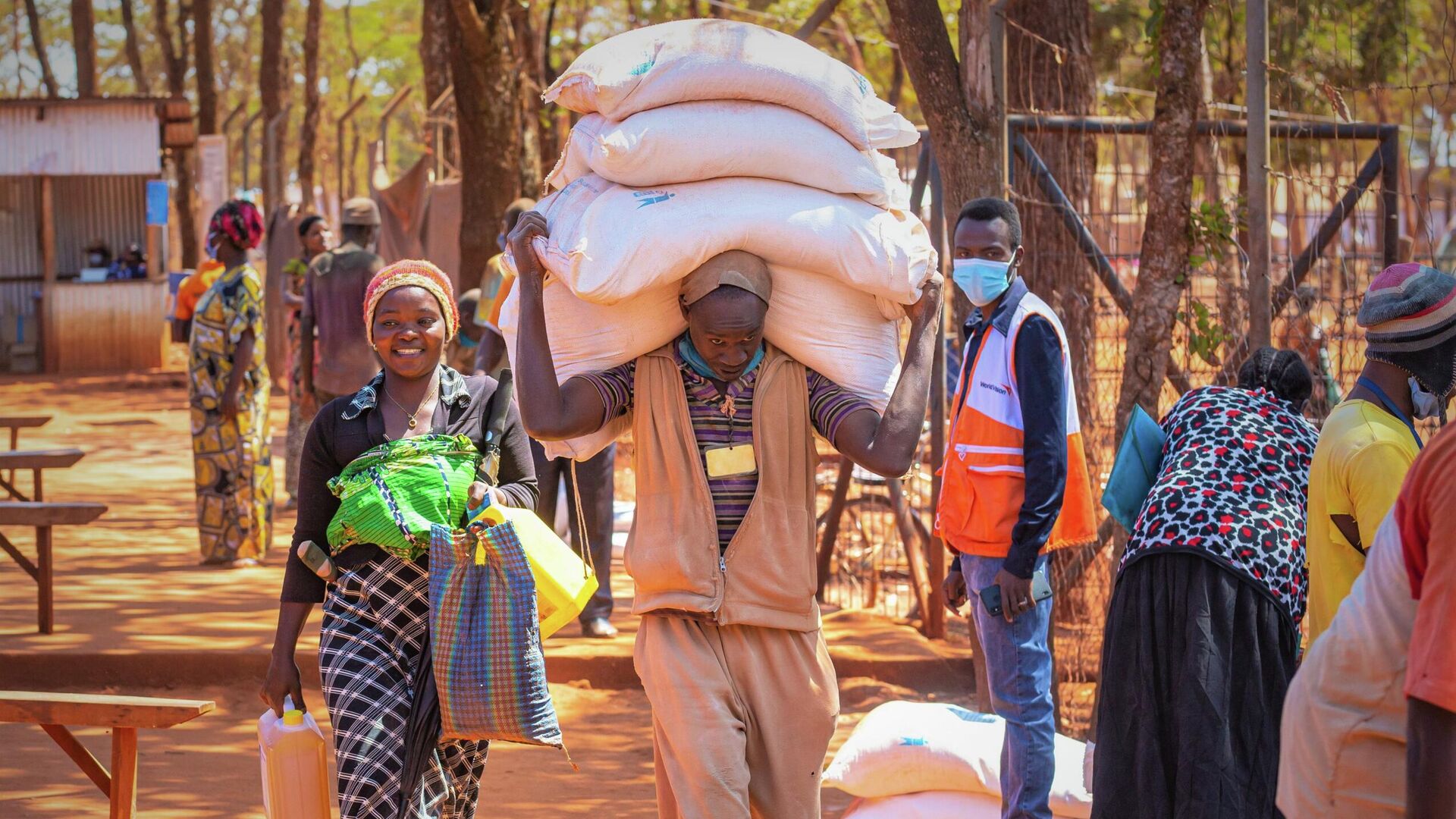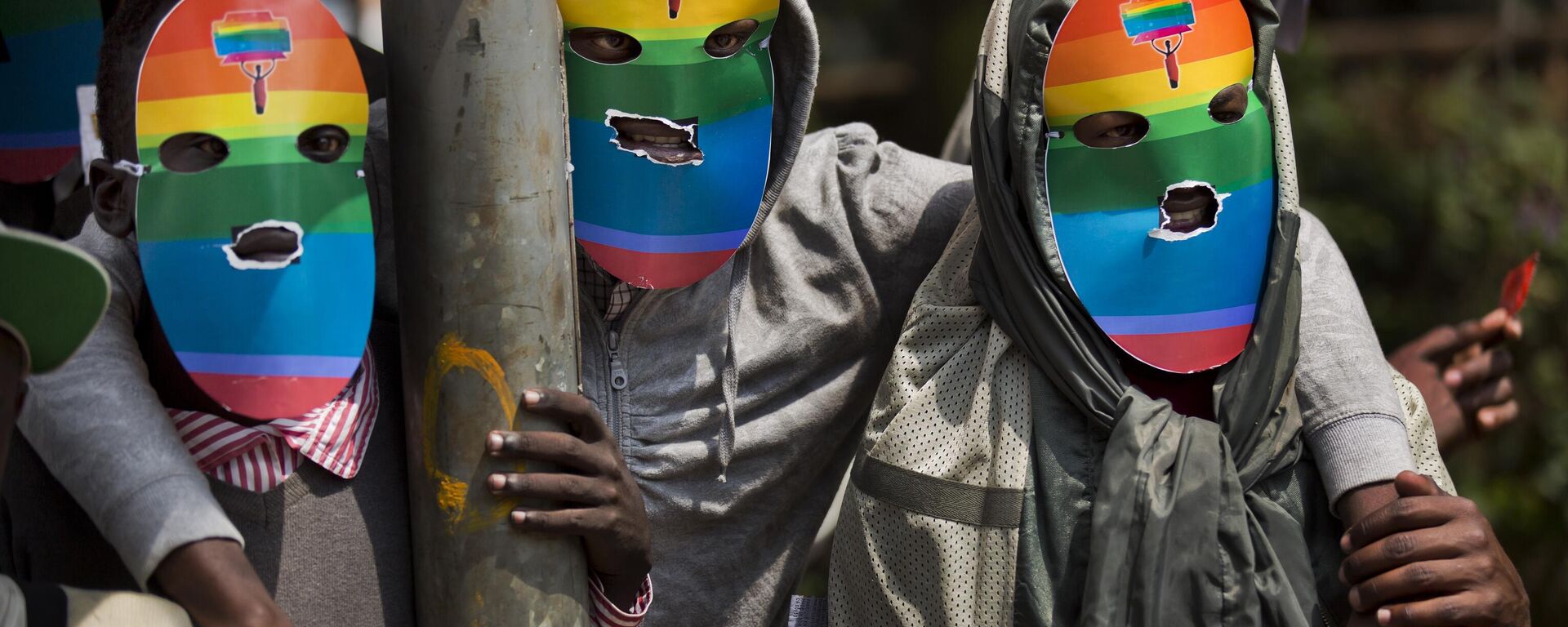https://en.sputniknews.africa/20231011/how-could-wests-reaction-to-family-protection-bill-impact-kenya--what-is-culturally-free-aid-1062696758.html
How Could West's Reaction to 'Family Protection Bill' Impact Kenya & What Is 'Culturally Free' Aid?
How Could West's Reaction to 'Family Protection Bill' Impact Kenya & What Is 'Culturally Free' Aid?
Sputnik Africa
In July, Kenya's Homa Bay County MP Peter Kaluma tabled a "Family Protection Bill" in the country's parliament that seeks, among other things, to ban... 11.10.2023, Sputnik Africa
2023-10-11T18:36+0200
2023-10-11T18:36+0200
2023-10-11T19:08+0200
opinion
kenya
east africa
united states (us)
uganda
european union (eu)
economy
anti-homosexuality
anti-lgbt
culture
https://cdn1.img.sputniknews.africa/img/07e7/08/15/1061505399_0:68:2548:1501_1920x0_80_0_0_d365b7ae7fa24dad7df1f3f64ce4eb15.jpg
In his recent report on the possible passage of Kenya's anti-LGBTQ bill, Professor Fred Ogola, an economist and social scientist, pointed out that such a move could risk the East African nation losing some $28 billion in financial support due to Kenya's dependence on foreign donors.Sputnik Africa sat down with Professor Ogola to discuss what the West's push for the LGBTQ agenda could mean for the economies of African counties seeking to protect their cultural values.Western countries should respect the culture of Africa and Kenya, the expert said, arguing that Africans are not telling the West what to do.The social researcher also pointed out that Kenya cannot allow trends to take root in its society that could "bring about our cultural degradation just because of money," adding that "Kenyans in public abhor and do not like LGBTQ trends."According to the expert, money is used by countries such as the US, UK and EU to "ensure that their policies are followed". In this vein, Ogola said that it is "not right" for Western countries to place preconditions on the release of funds to African countries.Speaking about the current global economic system, Ogola noted that the flow of money from developing countries to developed countries far exceeds the flow of money from developed countries to emerging countries, leading to the conclusion that "developing countries are actually the ones financing the developed countries". At the same time, he said that as the continent strives for freedom, African countries are still too dependent on the West.The expert concluded by saying that given the current situation, signing the bill would create more disadvantages than advantages for Kenya.At the end of May, Kenya's neighbor Uganda passed the Anti-Homosexuality Bill 2023, which criminalizes the promotion of homosexuality and provides for the death penalty for certain crimes, such as engaging in homosexual acts with a minor child. The bill, which authorities say is intended to protect the country's cultural, religious and family values, has caused an outcry in Western countries. The World Bank called it a "violation of human rights" and suspended loans to Uganda, while Washington imposed sanctions on Ugandan officials linked to the law.In response, Ugandan President Yoweri Museveni called some Western actors, including the lender, "insufferable" and noted that foreign loans are not a "decisive" element in the implementation of the country's socio-economic program.
https://en.sputniknews.africa/20230921/you-cant-dictate-morals-kenyan-lawmaker-links-move-to-allow-lgbtq-groups-to-western-influence-1062260657.html
kenya
east africa
united states (us)
uganda
Sputnik Africa
feedback@sputniknews.com
+74956456601
MIA „Rossiya Segodnya“
2023
Maxim Grishenkin
https://cdn1.img.sputniknews.africa/img/07e7/0a/17/1063018107_0:0:1104:1103_100x100_80_0_0_03090c85a11f5d2e8a19cf1d989443c9.jpg
Maxim Grishenkin
https://cdn1.img.sputniknews.africa/img/07e7/0a/17/1063018107_0:0:1104:1103_100x100_80_0_0_03090c85a11f5d2e8a19cf1d989443c9.jpg
News
en_EN
Sputnik Africa
feedback@sputniknews.com
+74956456601
MIA „Rossiya Segodnya“
Sputnik Africa
feedback@sputniknews.com
+74956456601
MIA „Rossiya Segodnya“
Maxim Grishenkin
https://cdn1.img.sputniknews.africa/img/07e7/0a/17/1063018107_0:0:1104:1103_100x100_80_0_0_03090c85a11f5d2e8a19cf1d989443c9.jpg
kenya, east africa, united states (us), uganda, european union (eu), economy, anti-homosexuality, anti-lgbt, culture, africa in details
kenya, east africa, united states (us), uganda, european union (eu), economy, anti-homosexuality, anti-lgbt, culture, africa in details
How Could West's Reaction to 'Family Protection Bill' Impact Kenya & What Is 'Culturally Free' Aid?
18:36 11.10.2023 (Updated: 19:08 11.10.2023) In July, Kenya's Homa Bay County MP Peter Kaluma tabled a "Family Protection Bill" in the country's parliament that seeks, among other things, to ban homosexuality, same-sex marriage, and gender reassignment prescriptions or procedures.
In his recent report on the possible passage of Kenya's anti-LGBTQ bill,
Professor Fred Ogola, an economist and social scientist,
pointed out that such a move could risk the East African nation losing some $28 billion in financial support due to Kenya's dependence on foreign donors.
Sputnik Africa sat down with Professor Ogola to discuss what the West's push for the LGBTQ agenda could mean for the economies of African counties seeking to protect their cultural values.
Western countries should respect the culture of Africa and Kenya, the expert said, arguing that Africans are not telling the West what to do.
"The Western nations need to respect the African, the Kenyan culture and the way we do [...] We don't come to the West also to tell you what you need to do," Ogola stressed. "The issue is when you go to Rome, do as the Romans. So when you come to Africa, understand Africans, they also have something they hold dear."
The social researcher also pointed out that Kenya
cannot allow trends to take root in its society that could "bring about our cultural degradation just because of money," adding that "Kenyans in public abhor and do not like LGBTQ trends."
According to the expert, money is used by countries such as the US, UK and EU to "ensure that their policies are followed". In this vein, Ogola said that it is "not right" for Western countries to place preconditions on the release of funds to African countries.
"When you give us aid, don't give X, Y, Z conditions. Let the aid come when it is culturally free. We don't want aid that brings the culture from somewhere to live," he remarked.
Speaking about the current global economic system, Ogola noted that the flow of money from developing countries to developed countries far exceeds the flow of money from developed countries to emerging countries, leading to the conclusion that "developing countries are actually the ones financing the developed countries".
At the same time, he said that as the continent strives for freedom, African countries are still too dependent on the West.
"For now, because they [African countries] over-depend and over-rely on the Western nations, they might not actually be free because Africa looks like one of the children or the Western nations who are sleeping in their father's house. Yet they are looking for freedom," the expert pointed out.
The expert concluded by saying that given the current situation, signing the bill would create more disadvantages than advantages for Kenya.
"As someone once said, every time humanity tries to solve a problem, it creates very many other bigger problems. And I hope that [President Ruto] realizes that by signing this bill, you get bigger problems than the problem we are trying to address. And therefore it does not merit creating a bigger problem by trying to solve a small problem," the expert said.
At the end of May, Kenya's neighbor Uganda passed the Anti-Homosexuality Bill 2023, which criminalizes the promotion of homosexuality and provides for the death penalty for certain crimes, such as engaging in homosexual acts with a minor child.
The bill, which authorities say is intended to protect the country's cultural, religious and family values, has caused an outcry in Western countries. The World Bank called it a "violation of human rights" and suspended loans to Uganda, while Washington imposed sanctions on Ugandan officials linked to the law.
In response, Ugandan President Yoweri Museveni
called some Western actors, including the lender, "insufferable" and noted that foreign loans are not a "decisive" element in the implementation of the country's socio-economic program.



